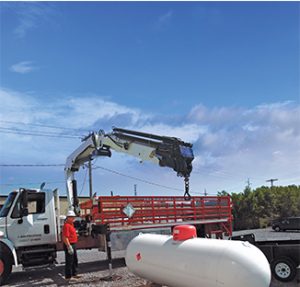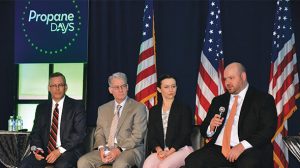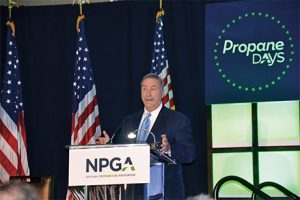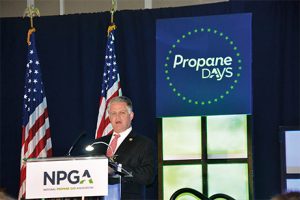OSHA’s crane rule pushes the propane industry to action

Photo courtesy of the Propane Education & Research Council
The propane industry has gone on the offensive in a crane-rule fight against the federal government. At stake: an estimated $151 million in certification and training costs every five years.
With the compliance deadline set for Nov. 10, 2018, the cranes and derricks in construction standard would require third-party certification every five years for crane operators working in construction activities. The rule, first finalized in 2010 before facing two delays, covers the propane industry practice of tank delivery and retrieval and impacts about 40,000 propane field technicians nationwide, according to the National Propane Gas Association (NPGA).
In response to the impending deadline, the NPGA has ramped up activity on the rule over the last eight months, since the Occupational Safety & Health Administration (OSHA) last delayed the compliance date.
The rule is unnecessary, NPGA argues, because the industry already offers programs for crane safety training, and propane tank delivery and retrieval is unrelated to construction activities.

NPGA’s advocacy team discusses the issues for Propane Days attendees ahead of meetings on Capitol Hill. The team, from left, is composed of Phil Squair, Mike Caldarera, Sarah Reboli and Michael Baker. Photo by Brian Richesson
“When it became clear OSHA was not interested in doing anything that was going to change the rule fundamentally, write us out or help us avoid the worst pitfalls of third-party certification, the requirements for us to take control of the issue ourselves and drive it over OSHA’s hurdles became very clear,” says Phil Squair, senior vice president of public and governmental affairs.
NPGA has wielded “every tool available to us in advocacy,” including opportunities on Capitol Hill, in agencies and with the legal system, Squair says. It also prioritized the rule during Propane Days, the industry’s lobbying event, in June.
“We’ve tried to work at the agency level of OSHA to get relief,” Squair says. “They’ve remained steadfast and slow at coming up with their rulemaking. It’s certainly been a challenge.”
Support in Washington

Larry Sabato, a political analyst and author, delivers the keynote speech at Propane Days. Photo by Brian Richesson
Rep. Drew Ferguson, R-Ga., provided a needed boost to industry efforts when he introduced the Common Sense Certification Reform Act (HR 5988) prior to Propane Days. The House bill would exempt the propane industry from the third-party certification requirement. Squair called Ferguson “king crane rule on Capitol Hill.”
“This is to me a perfect example of how out of touch Washington and the bureaucrats are with what goes on in rural America every day. It simply does not make sense,” says Ferguson, who spoke to Propane Days attendees prior to their visits with elected officials.
“I bet you the person who wrote that rule has never seen a propane tank,” he says.
The industry asked representatives during Propane Days to cosponsor HR 5988 and for senators to introduce companion legislation. Reps. Francis Rooney, R-Fla., and Bob Gibbs, R-Ohio, have sponsored the bill, along with Ferguson.
Also during Propane Days, AmeriGas President and CEO Jerry Sheridan sent a company-wide email, asking all of his employees to help with the issue by contacting their members of Congress about cosponsoring Ferguson’s bill.

Rep. Drew Ferguson, R-Ga., supports the propane industry. He introduced the Common Sense Certification Reform Act, which would exempt propane from crane-rule requirements. Photo by Brian Richesson
“We feel our current training provides the knowledge and skills necessary for the safe operation of our cranes. That is why we are strongly supporting the Common Sense Certification Reform Act – HR 5988,” Sheridan says.
The association has taken its fight to the grassroots level – “this is a monster grassroots type of issue,” Squair adds – and organized an expansive letter-writing campaign. As of June 7, the industry had sent more than 2,000 emails to members of Congress, asking them to cosponsor the bill and exempt propane tank delivery and retrieval from the rule. NPGA urges the industry to continue this outreach to its respective members of Congress and offers automated tools, including a prewritten letter, on the Take Action page at npga.org.
NPGA also created a three-minute video that outlines the industry’s perspective on the rule. Also available for viewing on the Take Action page at npga.org, it explains the difference between propane company activities and those that take place in the construction industry. Propane industry leaders in the video, including new NPGA chairman Chris Earhart of Dixie Gas & Oil, underscore the importance of safety and explain how the industry already has crane safety training and educational procedures tailored to propane tank delivery and retrieval. The Propane Education & Research Council, for example, offers a mobile crane training program.
“If a picture is worth a thousand words, this video is worth $151 million,” says Sarah Reboli, director of regulatory affairs at NPGA.
NPGA says propane industry-developed training should also satisfy a new OSHA-proposed rule – published in May – that adds an ongoing duty for employers to qualify, or train, employees who operate cranes. OSHA, however, does not include in the proposal any of NPGA’s outreach to the agency, the association notes.
The Issues
The National Propane Gas Association (NPGA) focused on four issues at the 2018 Propane Days lobbying event. In addition to the crane rule, here is a look at the other issues on which the industry lobbied congressional leaders:
- Alternative fuel tax credits: Alternative fuel tax credits are essential to the growth of propane as an alternative fuel, NPGA says. The alternative fuel tax credit, the alternative fuel infrastructure tax credit and the alternative fuel mixture credit expired at the end of 2017. A long-term extension of five years of these credits would help solidify customers in the private and public sectors who are considering buying alternative fuel vehicles, NPGA says.
- DRIVE Safe Act: The DRIVE Safe Act, HR 5358, would create an apprenticeship program for commercial truck drivers and help address the current driver shortage that threatens the industry’s ability to deliver propane efficiently. The DRIVE Safe Act would direct the secretary of transportation to issue regulations permitting an 18 to 21-year-old commercial driver’s license holder to drive a commercial vehicle across state lines, both during and upon the completion of a two-step apprenticeship program.
- Jones Act: The industry seeks an exemption for propane shipments under the Jones Act. This maritime law mandates that only American-made, flagged and crewed ships can transport cargo between U.S. ports, but there are no Jones Act-compliant propane cargo vessels. Such a waiver, NPGA says, would improve the energy security of American citizens by allowing the industry to serve U.S. regions during peak demand conditions and possible supply disruptions. The Jones Act only serves to reduce the options available to propane shippers for serving American consumers, NPGA says.

















Thank Brian Richesson for the article. You and the team always deliver interesting and informative propane news.